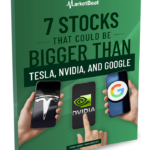“There is an enormous difference between perfect competition and monopoly, and most businesses are much closer to one extreme than we commonly realize.”
– Peter Thiel
Legendary investor Peter Thiel thinks that a business is either facing a perfect competition or has a monopoly position in the market. Assuming this is true, investors should look only for the latter kind of company to invest in, as no company makes a durable economic profit without a lasting competitive advantage.
However, it is understandable that the management from either side has an interest in “confusing” the public; businesses without a long-term edge are eager to “advertise” their ability to fend off competition and lead the market consistently. In contrast, truly monopoly ones hope to disguise their industry-dominating power, which could look “evil” to some stakeholders who are worried about rising prices for consumers.
In this regard, our quick-and-dirty approach to look for well-moated names is to simply use the antitrust investigation as an indicator. After all, a monopoly-like business wins its market dominance for one reason or another for so long that it is highly likely to have attracted scrutiny. Also, a double check on its return on capital will undoubtedly help add to the conviction in terms of the existence of moats.
Take a look at MasterCard (NYSE:MA) and Visa (V), the world’s leading payment processing companies. Despite being part of a four-company oligopoly (so neither of them should be technically called a monopoly), both companies have been involved in a wide range of antitrust cases, including even being sued by American Express (NYSE:AXP) and Discover Financial Services (NYSE:DFS). If we look at the number, MasterCard and Visa, in total, have represented a more than 80% market share for years, which translates into a consistently superior return on capital for both (see below).

<p class="canvas-atom canvas-text Mb(1.0em) Mb(0)–sm Mt(0.8em)–sm" type="text" content="Alphabet's (NASDAQ:GOOG) (NASDAQ:GOOGL) Google search engine and Microsoft’s (NASDAQ:MSFT) operating system are two other prominent examples of well-moated companies. The former dominates nearly 90% of the global market for search engines, according to Statcounter. The European Union has been a frequent investigator into Google’s practices for possible violations to its competition laws, which resulted in several charges related to Google Shopping and Google AdSense.” data-reactid=”31″>Alphabet’s (NASDAQ:GOOG) (NASDAQ:GOOGL) Google search engine and Microsoft’s (NASDAQ:MSFT) operating system are two other prominent examples of well-moated companies. The former dominates nearly 90% of the global market for search engines, according to Statcounter. The European Union has been a frequent investigator into Google’s practices for possible violations to its competition laws, which resulted in several charges related to Google Shopping and Google AdSense.
Notoriously, Microsoft was even ordered to split up in 2000, though the federal judge’s decision was reversed on appeal. Microsoft was sued by the Department of Justice with the allegation of having abused monopoly power on personal computers in the handling of operating system and web browser integration. Fast forward to today, and the company still dominates the desktop/notebook operating system market with a share of over 80%. Meanwhile, it split the office software space roughly half and half with Alphabet. Both companies maintained a good return on assets for the last decade (see below).

Disclosure: The mention of any security in this article does not constitute an investment recommendation. Investors should always conduct careful analysis themselves or consult with their investment advisors before acting in the stock market. We own shares of MasterCard.
Read more here:
Not a Premium Member of GuruFocus? Sign up for a free 7-day trial here.
<p class="canvas-atom canvas-text Mb(1.0em) Mb(0)–sm Mt(0.8em)–sm" type="text" content="This article first appeared on GuruFocus.
” data-reactid=”48″>This article first appeared on GuruFocus.










